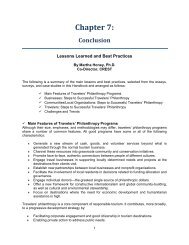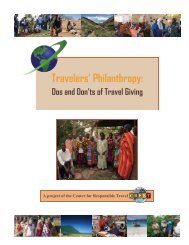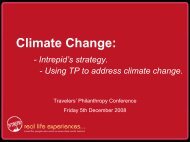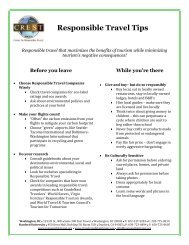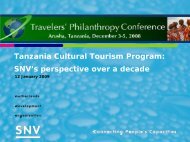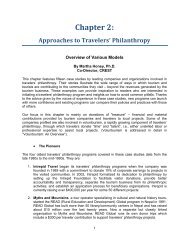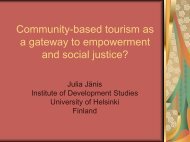Travelers' Philanthropy Handbook - Center for Responsible Travel
Travelers' Philanthropy Handbook - Center for Responsible Travel
Travelers' Philanthropy Handbook - Center for Responsible Travel
Create successful ePaper yourself
Turn your PDF publications into a flip-book with our unique Google optimized e-Paper software.
confident that their money will go directly to the activities and projects they envision it willsupport. While they understand that the costs of program administration must be paid(everything from lights and paperclips to board meetings and perhaps even salaries), theydemand reassurance that paying the overhead won’t gobble up a significant proportion of theirdonation. In addition, they worry their money could be taken by government or by programmanagers or even stolen by other people. A fairly large proportion said it was important to knowthat the country they were visiting (in this case, Ecuador or Mexico) was doing as much as itcould to support local conservation and not just relying on the “turistas” to pay <strong>for</strong> all of it.Table 2. Doubts travelers cite about donating to a philanthropy fund.• There will be skimming or tampering by government (76%)• My $$ went to a “black hole”—no way to verify whether it is making a difference(75%)• My $$ will be diluted because of excessive overhead and administrative costs(70%)• My $$ weren’t really needed because they already have plenty of money (61%)• I’ll feel like I wasted my money because the country’s own government wasn’tdoing its part to support conservation. (50%)• The threats to nature weren’t real or they were exaggerated (42%)• Corrupt local government officials will steal the money (38%)• I worry that I’ll later feel tricked or duped (15%)• My $$ were redundant because I’m already a member of conservationorganization (5%)Percentages do not add to 100 because respondents could indicate more than one doubt.Finally, the interviews revealed that normative influences played only a minor role in thesetravelers’ philanthropy decisions (Table 3). Spouses, children, bosses, fellow passengers, andconservation organizations (which are typical sources of normative influence on other types oftravelers’ decisions) were rarely mentioned when I asked respondents to list “individuals orgroups whose opinions matter to you” who would either approve or disapprove of your donating.The most common reply to the “who would approve” question was “Lindblad Expeditions“(owingto the brand loyalty Lindblad enjoys with its guests), but the second most common reply in thesetwo studies was “no one.” Notably, while a few guests felt that the opinion of various largeTable 3. Normative influences cited by travelers who are considering donating to aphilanthropy fund.• It is important whether Lindblad Expeditions (or Sven Olof Lindblad personally)encourages me to contribute (55%)• No one’s opinion matters but my own; I know what’s right to do (43%)• It is important whether large credible NGOs like WWF, TNC, CI and Audubonsupport my contributing to the fund (10%)• It is important whether my spouse or partner supports my contributing to the fund(1%)Percentages do not add to 100 because respondents could indicate more than one social referent.conservation NGOs was a factor in their decision, 90% of them did not. These rather consistentresults from the two studies paint a picture of a donor who is not very “other directed” in144




